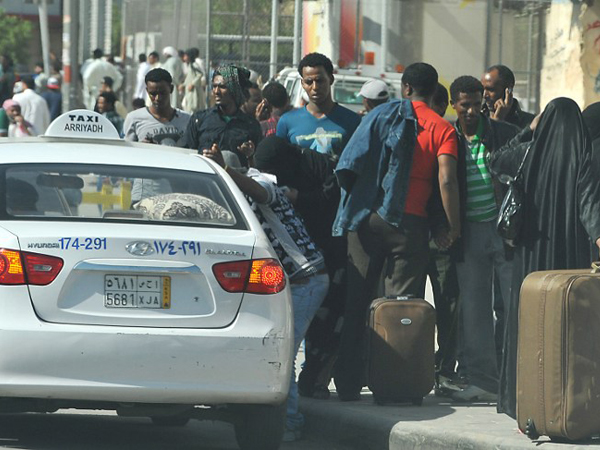
Foreign workers wait for a taxi as they leave the Manfuhah neighborhood of the Saudi capital Riyadh on Sunday, Nov. 10, 2013, after two people were killed in clashes between Saudi and other foreign residents the previous day, according to the Saudi police. On November 4, the authorities began rounding up thousands of illegal foreign workers following the expiry of a final amnesty for them to formalize their status. AFP
RIYADH—Hundreds of illegal migrants targeted in a Saudi nationwide crackdown turned themselves in on Sunday after security forces besieged a Riyadh neighborhood where riots had killed two people.
Men, women and children lined up carrying their belongings to board police buses transferring them to an assembly center before their deportation, a week after a seven-month amnesty expired.
Police said they intervened on Saturday following riots in the poor Manfuhah neighborhood of the capital after foreigners attacked Saudis and other foreign expats with rocks and knives.
One Saudi and another person, whose nationality and identity remains unknown, were killed, said a police statement carried by the SPA state news agency.
Another 68 people—28 Saudis and 40 foreigners—were injured and 561 were arrested.
The Manfuhah district of Riyadh is home to many illegal migrants, mostly from east Africa.
On Sunday, police laid siege to the district while units from the National Guard and special forces were sent in, an AFP photojournalist said.
The Ethiopian government said on Saturday it was repatriating citizens who had failed to meet the deadline of a seven-month amnesty, citing reports that an Ethiopian had been killed by police.
“They were trying to get them in the camp before repatriation and in that process… an Ethiopian has been killed with a police bullet, but we are verifying it,” foreign ministry spokesman Dina Mufti told AFP in Addis Ababa.
Saudi police said on Saturday illegal migrants in Manfuhah have been given the chance to come forward and that accommodation has been made available while their repatriation is arranged.
On Monday, the authorities began rounding up thousands of illegal foreign workers following the expiry of a final amnesty for them to formalize their status.
Those considered to be illegal range from overstaying visitors and pilgrims seeking jobs to shop assistants and day laborers working for someone other than their sponsor.
Having an official sponsor is a legal requirement in Saudi Arabia and most other Gulf states.
Nearly a million migrants—Bangladeshis, Filipinos, Indians, Nepalis, Pakistanis and Yemenis among them—took advantage of the amnesty to leave.
Another roughly four million were able to find employers to sponsor them, but in so doing virtually emptied the market of cheap freelance labour.
Expatriates account for a full nine million of the oil-rich kingdom’s population of 27 million.
The lure of work, even in low-paid jobs as domestics or construction workers, has made the country a magnet for migrants from Asia as well as from poorer Arab states.
Despite its huge oil wealth, Saudi Arabia has a jobless rate of more than 12.5 percent among its native population, a figure the government has long sought to cut.
Saudi economists have insisted that the departure of illegal workers will benefit the largest Arab economy in the long run, but Saudis have already begun to feel the pinch of a surging cost of labor because of a shortage of day workers.
Saudis and expatriates say that casual workers who used to queue in public squares for odd jobs have virtually disappeared since police began strictly enforcing tough labor laws.
The labor ministry said on Saturday it will continue to accept applications from undocumented foreigners seeking to legalize their status, but that they will be fined for the elapsed period since the amnesty ended on Nov. 3.—Fayez Nureldine
RELATED STORY:
Saudi assurance: No arrests while OFWs are processed